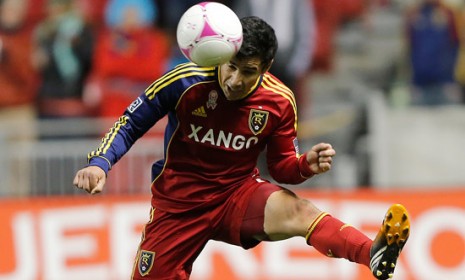Do soccer players experience brain damage, too?
A new study finds that much like their counterparts in the NFL, soccer players who routinely head soccer balls could be harming their brains

A free daily email with the biggest news stories of the day – and the best features from TheWeek.com
You are now subscribed
Your newsletter sign-up was successful
The question: The medical community has already called out the NFL over years of evidence that suggests its players are susceptible to retiring with long-term brain damage. But what about other sports where direct head contact is routine? A small study from Harvard Medical School takes a look at professional soccer players, and whether a lifetime of heading the ball — even if it doesn't cause a concussion — can lead to brain damage.
How it was tested: Researchers enlisted 12 male soccer players from an elite-level club in Germany; all of them had been playing for more than 13 years. As a control, 11 competitive swimmers were brought on and matched for age, handedness, and sex. None of the participants in the study had a history of concussions, and all were subjected to something called high-diffusion tensor imaging (DTI), which "looks at the brain microscopically and is much more effective at catching white matter changes than the standard MRI," says Alexandra Sifferlin at TIME. White matter is made of nerves that play a role in connecting the different regions of the brain associated with cognition.
The outcome: After the DTI results were adjusted for the individual players' age and years of training, the white matter in the brains of soccer players showed noticeable evidence of damage, such as changes to nerve fiber protectors. The origin of the damage, however, is unclear: "Although 'heading' of the ball may be to blame," says Monte Morin at The Los Angeles Times, "other factors — such as falling to the ground or hitting goal posts or crashing into other players — could play a role as well."
The Week
Escape your echo chamber. Get the facts behind the news, plus analysis from multiple perspectives.

Sign up for The Week's Free Newsletters
From our morning news briefing to a weekly Good News Newsletter, get the best of The Week delivered directly to your inbox.
From our morning news briefing to a weekly Good News Newsletter, get the best of The Week delivered directly to your inbox.
What experts say: "Although our study is small, it is the first to look at soccer players with no symptoms and no diagnoses of concussions," says Dr. Inga K. Koerte at Harvard Medical School. "We think it is an important finding not just for soccer players, but other athletes of other sports too." Studies of repetitive blows to the head "would have tremendous public health implications," says Dr. Jeffrey Bazarian, an associate professor of emergency medicine at URMC who was not involved with the study, "...because everyone, even at a young age, hits their head like this."
The lesson: Repeated hits to the head, even if they don't lead to a concussion, can still cause changes to the brain. The exact extent of that damage and what that entails, however, is in the hands of future research beyond this preliminary study.
A free daily email with the biggest news stories of the day – and the best features from TheWeek.com
-
 The ‘ravenous’ demand for Cornish minerals
The ‘ravenous’ demand for Cornish mineralsUnder the Radar Growing need for critical minerals to power tech has intensified ‘appetite’ for lithium, which could be a ‘huge boon’ for local economy
-
 Why are election experts taking Trump’s midterm threats seriously?
Why are election experts taking Trump’s midterm threats seriously?IN THE SPOTLIGHT As the president muses about polling place deployments and a centralized electoral system aimed at one-party control, lawmakers are taking this administration at its word
-
 ‘Restaurateurs have become millionaires’
‘Restaurateurs have become millionaires’Instant Opinion Opinion, comment and editorials of the day